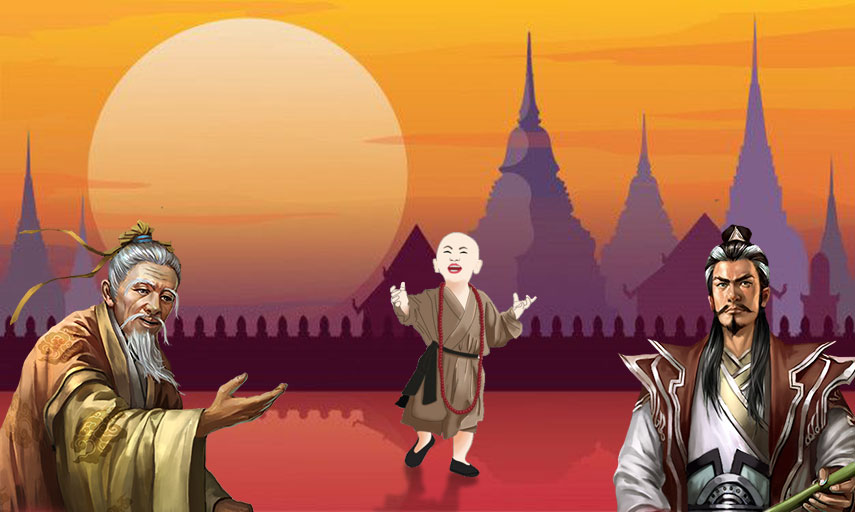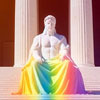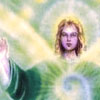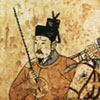A Tale Of Two Masters
 by Pierre Delattre
by Pierre Delattre
Reports reached the Dalai Lama that a certain Master of Kung Fu was roaming the countryside converting young men to the study of violence. Though Tibetan by birth, this man had been raised in Peking and was said to have returned as a secret agent to astonish Tibetans with the superior power of the Chinese in such a way as to render the country open and eager for conquest.
The Master of Kung Fu had made his reputation by taking on eight fierce Lolo warriors who attacked him on a mountain pass, killing seven of them so quickly that the one with the broken legs who survived swore the marvelous voyager had met their attack with movements so swift he seemed merely to walk through them and continue peacefully on his way.
Wherever the Master of Kung Fu stopped, he gathered followers and admirers who were fascinated by the mystical beauty of his methods. The dance of destruction, which he was always glad to perform in slow motion before an audience in the marketplace, was said to be awesomely beautiful. Done swiftly, the dance could not be seen. The master would seem to be standing absolutely still. Only a rush of wind indicated that he had spun about, throwing out his arms and legs in such fashion as to leave at least a dozen of the young toughs who were trying to dodge him grabbing at the parts of their bodies he had playfully flicked with his hands or feet to indicate which bones he could have broken, which organs destroyed.
Against all Buddhist laws, there had been unnecessary slaughter of yaks in order to provide the many husky monks, who had abandoned their lamaseries and robes, with black leather outfits like the one the Master of Kung Fu wore from neck to ankle, his huge muscles making the costume tight as his own flesh.
These leather-sheathed disciples followed their master everywhere challenging each other to duels, many of which ended in death or crippling. The Regent and other advisers to the Dalai Lama were deeply concerned, especially after blasphemous rumors began circulating that the Master of Kung Fu was an incarnation of Shiva, Hindu god of destruction.
There would have been riots had they thrown the man in jail, since he had done nothing wrong. He had a perfect right to be in the country. Not since his brilliant defense against the Lolos had he seriously injured anyone. When government officials questioned his intentions, he said that he was a sincere religious mystic trying to communicate certain cosmic laws learned from his Chinese guru.
It was decided not to attack him publicly, but in conformity with old Tibetan customs when someone claims religious privilege for questionable acts, to invite him most courteously to visit the Dalai Lama.
Pleased with the invitation, the Master of Kung Fu strode into the Dalai Lama’s ceremonial hall. Being only ten years old at the time, the young God-King could not help but be impressed with the marvelously potent vibrations he gave off. They reduced the monks and lamas present to womanish giggling and gasping. The Master of Kung Fu was indeed a handsome, dashing fellow with his thick blue-black hair falling down over the shoulders of his leather suit. His teeth flashed confidently under a handlebar mustache. He did not prostrate himself but merely bowed gallantly, then leaned back to fill his chest with air until his whole body seemed to swell, tighten, and gleam.
“Your Highness,” he began, “I know why you asked me here and I want you to stop worrying. Ugliness is my only enemy. You’re all beautiful people” – a titter from the monks – “and I wouldn’t think of doing you harm.”
“When you want to do harm,” asked the Dalai Lama, “what kind of harm can you do?”
“Well, I don’t want to see it as harm at all, Highness. I want to see it as help. I’m a lover of beauty is what I am, just like any enlightened man. And I know as well as you that you can’t raise up beauty in this world without clearing out the ugliness first. You may not be able to see the results right now – in fact it may seem like just the opposite – but what I’m doing is I’m raising up beauty by training a special cadre of men to prepare the ground. That’s why I like to do my recruiting from the lamaseries. There’s too much ugliness in this world, much too much. Something’s got to be done about it by people who can back their strength with moral zeal. I figure the place to start is right here in this country where I was born. I could use your help to get the job done.”
“What exactly do you do?” asked the Dalai Lama.
“Royal Highness, the best way to show you would be for you to stand here in front of me while I do a little dance it took me some fifteen years to perfect. Though I can kill a dozen men instantly with this dance, have no fear. This will only be a demonstration of ugliness destruction. Without seeing these ugly forces destroyed – for my arms and legs move faster than the blades of a helicopter – you will experience the great quietness that comes afterward when they are stilled.”
The Dalai Lama stood up and immediately felt as if a wind had blown flower petals across his body. He looked down but saw nothing. “You may proceed,” he told the Master of Kung Fu.
“Proceed?” said the other, grinning jovially. “I’ve already finished. What you felt were my hands flicking across your body. If it please Your Highness, this was a demonstration in slow motion, extremely slow motion, of the way I could have destroyed the organs of your body one by one. With this knuckle, I could have severed the contact between your brain and your spine. With the tip of this finger, I could have left you impotent. With the edge of this hand, I could have made it impossible for you to excrete. With this toe, I could have broken your arm while breaking your leg in the same motion with my heel. Your eyes, ears, nose, throat, spleen, liver . . . you name it. I could have taken them all out during that one little dance.”
Beaming with pride, he flexed his muscles and looked his body over, up and down, approvingly. “To achieve the great peace,” he concluded, “there are demons inside and outside that need to be eradicated. They appear and disappear so rapidly you cannot see them, but I’ve learned to see them and I can catch them and kill them before they get away, just as you catch a fly.”
“I do not catch flies,” said the Dalai Lama. A murmur of approval went up from the assembled monks. “No,” said the Dalai Lama, glad to hear that his comrades had not been entirely seduced, “we do not catch flies in Tibet.”
The Master of Kung Fu seemed momentarily taken aback, but he puffed himself up one more and resumed: “Quite so. But there is much sickness in this land due to the flies. In China there is very little sickness since every man knows how to catch a fly. Your Highness, I was not brought up in the serene tranquility of this palace but in the streets of a city much like your Lhasa only larger. In the city called Peking I looked at eyes muddled from staring through fumes of putrefaction at images of capitalistic lust. I heard mouths speak incessantly to presumed social inferiors in tones full of insult, contempt, dissimulation, and vengeance. I have known hearts to beat excitedly over the torture of innocent men. I have watched gluttons with bloated stomachs riding on the backs of starvelings. I have seen legs wobbling pathetically to hold up a body poisoned by chemicals. I have seen ears eagerly bending to rumor, gossip, false reports, and greedy evangelisms of all kinds. In short, I have witnessed corruption in every part of man’s body and have taken it upon myself to destroy this corruption once and for all.”
“And after it’s destroyed?” asked the Dalai Lama.
“It is destroyed. Mine may only be an art of preliminaries but it is final. And I am its master.”
“I know a master greater than you,” said the Dalai Lama.
“Without wishing to offend Your Highness, I doubt that very much.”
“Yes, I have a champion who can best you,” insisted the boy king.
“Let him challenge me then, and if he bests me I shall leave Tibet forever.”
“If he bests you, you shall have no need to leave Tibet.”
The Dalai Lama looked around to see if his monks were as confident as he was, but they all looked very disconsolate. The huge guards were looking away, hoping he wouldn’t call on one of them; and the others were looking at the guards, obviously convinced that not one of them stood the slightest chance.
The Dalai Lama clapped his hands. “Regent,” he said, “summon the Dancing Master, and while we’re waiting let’s have some tea.”
The tea ceremony was just about over when the Regent returned with the Dancing Master. He was a wiry little fellow, half the size of the Master of Kung Fu and well past his prime. His legs were entwined with varicose veins and he was swollen at the elbows from arthritis. Nevertheless, his eyes wee glittering merrily and he seemed eager for the challenge.
The Master of Kung Fu did not mock his opponent. “My own guru,” he said, “was even smaller and older than you, yet I was unable to best him until last year. I could have finished him easily had I ever been able to touch him, but he moved too fast. Only last year did I finally catch him on the ear and destroy him, as I shall destroy you when you finally tire. To show that I know your methods and won’t be tricked into exhausting my energy, I shall first let you strike me at will. Your frail little hands can do me no harm while I’m at full strength.”
The two opponents faced off. The Master of Kung Fu was taking a jaunty, indifferent stance, tempting the other to attack.
The old Dancing Master began to swirl very slowly, his robes wafting around his head. His arms stretched out and his hands fluttered like butterflies toward the eyes of his opponent. The fingers settled gently for a moment upon the bushy eyebrows. The Master of Kung Fu drew back in astonishment. He looked around the great hall. Everything was suddenly vibrant with rich hues of singing color. The faces of the monks were radiantly beautiful. It was as if his eyes had been washed clean for the first time.
The fingers of the Dancing Master stroked the nose of the Master of Kung Fu and suddenly he could smell pungent barley from a granary in the city far below. He could smell butter melting in the most fragrant of teas, as the Dalai Lama, incomparably beautiful, sipped tea and watched him calmly. A flicking of the Dancing Master’s foot at his genitals, and his penis was throbbing with desire, pushing to break loose from its leather-bound sheath. The sound of a woman singing through an open window filled him with exquisite yearning to draw her into his arms and caress her. He found himself removing his leather clothes until he stood naked before the Dancing Master, who was now assaulting him with joy at every touch.
His body began to hum like a finely tuned instrument. He could hear the great long horns resounding in a thousand rooms of the Potala, praising creation. He opened his mouth and sang like a bird at sunrise. It seemed to him that he was possessed of many arms, legs, and hands, and all wanted to nurture the blossoming of life.
The Master of Kung Fu began the most beautiful dance that had ever been seen in the great ceremonial hall of the Grand Potala. It lasted for three days and nights, during which time everyone in Tibet feasted and visitors crowded the doorways and galleries to watch.
Only when he finally collapsed at the throne of the Dalai Lama did he realize that another body was lying beside him. The old Dancing Master had died of exertion while performing his final and most marvelous dance. But he died happily, having found the disciple he had always yearned for. The new Dancing Master of Tibet took the frail corpse in his arms and, weeping with love, drew the last of its energy into his body. Never had he felt so strong.
Posted in Other Topics, Spiritualitywith comments disabled.





